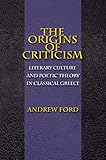The Origins of Criticism : Literary Culture and Poetic Theory in Classical Greece / Andrew Ford.
Material type: TextPublisher: Princeton, NJ : Princeton University Press, [2009]Copyright date: ©2002Edition: Course BookDescription: 1 online resourceContent type:
TextPublisher: Princeton, NJ : Princeton University Press, [2009]Copyright date: ©2002Edition: Course BookDescription: 1 online resourceContent type: - 9780691120256
- 9781400825066
- Criticism -- Greece -- History -- To 1500
- Greek literature -- History and criticism -- Theory, etc
- Literature -- History and criticism -- Theory, etc
- Literature -- Philosophy
- Philosophy, Ancient
- Poetry -- History and criticism -- Theory, etc
- Rhetoric, Ancient
- LITERARY CRITICISM / Ancient & Classical
- 880.9/001
- PA35 -- F67 2002eb
- online - DeGruyter
- Issued also in print.
| Item type | Current library | Call number | URL | Status | Notes | Barcode | |
|---|---|---|---|---|---|---|---|
 eBook
eBook
|
Biblioteca "Angelicum" Pont. Univ. S.Tommaso d'Aquino Nuvola online | online - DeGruyter (Browse shelf(Opens below)) | Online access | Not for loan (Accesso limitato) | Accesso per gli utenti autorizzati / Access for authorized users | (dgr)9781400825066 |
Frontmatter -- Contents -- Preface -- Abbreviations -- Introduction: Defining Criticism from Homer to Aristotle -- Part I. Archaic Roots of Classical Aesthetics -- Part II. The Invention of Poetry -- Part III. Toward a Theory of Poetry -- Part IV. Literary Theory in the Fourth Century -- Epilogue -- Bibliography -- Index of Passages Discussed -- General Index
restricted access online access with authorization star
http://purl.org/coar/access_right/c_16ec
By "literary criticism" we usually mean a self-conscious act involving the technical and aesthetic appraisal, by individuals, of autonomous works of art. Aristotle and Plato come to mind. The word "social" does not. Yet, as this book shows, it should--if, that is, we wish to understand where literary criticism as we think of it today came from. Andrew Ford offers a new understanding of the development of criticism, demonstrating that its roots stretch back long before the sophists to public commentary on the performance of songs and poems in the preliterary era of ancient Greece. He pinpoints when and how, later in the Greek tradition than is usually assumed, poetry was studied as a discipline with its own principles and methods. The Origins of Criticism complements the usual, history-of-ideas approach to the topic precisely by treating criticism as a social as well as a theoretical activity. With unprecedented and penetrating detail, Ford considers varying scholarly interpretations of the key texts discussed. Examining Greek discussions of poetry from the late sixth century B.C. through the rise of poetics in the late fourth, he asks when we first can recognize anything like the modern notions of literature as imaginative writing and of literary criticism as a special knowledge of such writing. Serving as a monumental preface to Aristotle's Poetics, this book allows readers to discern the emergence, within the manifold activities that might be called criticism, of the historically specific discourse on poetry that has shaped subsequent Western approaches to literature.
Issued also in print.
Mode of access: Internet via World Wide Web.
In English.
Description based on online resource; title from PDF title page (publisher's Web site, viewed 08. Jul 2019)


